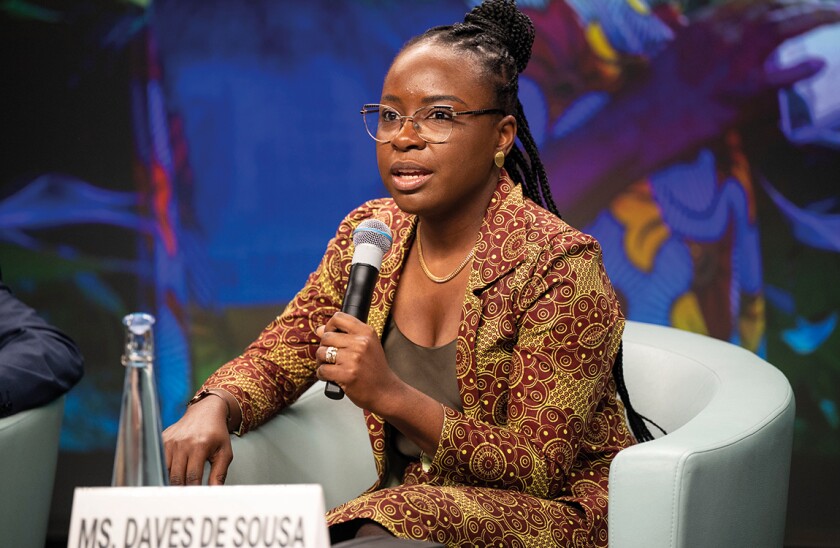As economic conditions in the Global South worsen, countries’ funding needs are increasing. But the lack of support for energy projects is proving problematic for countries rich in fossil fuels, like Nigeria and Angola.
Their attempts to diversify their economies are struggling, prompting questions about the wisdom of green lending policies at times of extreme financial duress.
“We need to express our voices so that our concerns are taken on board in the Bretton Woods institutions,” said Adama Coulibaly, minister of economy and finance of Côte d’Ivoire and outgoing chair of the G24. “There is such thing as climate pressure. Our position is that yes, we should all address the effects of climate change, but we shouldn’t ignore the fact that we have important issues at home; in particular financing issues, debt issues.
“That has to be taken on board. In other words, climate issues shouldn’t leave behind the entire issue of fighting poverty and development issues.”
In 2017, the World Bank announced it would stop financing upstream oil and gas projects, and several other MDBs have followed suit.
The Asian Infrastructure Investment Bank updated its energy sector strategy last year. It essentially restricts oil and gas financing to projects that reduce methane flaring or support small island communities where diesel use is unavoidable. But there are different perspectives on how restrictive the approach should be.
“That’s a topic of debate among different shareholders, but what we settled on was that this is something that, within a lot of limitations, we are willing to do,” said Danny Alexander, vice-president for policy and strategy at the AIIB. “Although we want to major on renewables, we know in some places, this [oil and gas] is going to continue to be important.”
This issue is bubbling beneath the surface as a dispute between African states that want to develop hydrocarbons and unwilling MDBs.
“There’s definitely a tension,” said Amaka Anku, practice head for Africa at the Eurasia Group. “It’s harder in some instances for [African] countries to raise money to develop oil and gas assets. If you look at Nigeria — the biggest economy and market — it’s going to be using fossil fuel for the next 50 years. Over 60% of the population is poor, most people can’t afford an EV.”
Some MDBs have supported continued use of gas (not coal) to ramp up power generation in emerging markets, recognising that in due course they will need to shift to greener production. The amount of greenhouse gases that will be generated by burning gas in African countries is still minuscule compared with the emissions of the US, Europe and China.
“There is an unfairness about countries that produce less than a tonne of carbon per capita not being given financing by countries that are producing 15 to 20, like Canada or America,” said Charlie Robertson, head of macro strategy at FIM Partners UK. “It is evidently unfair. Countries need every source of dollars they can get to fund investment into the domestic economy. They can’t just rely on foreign bailouts or foreign aid.”
Diversify or die
Economies in Africa that rely on oil and gas are trying to diversify. Nigeria is almost entirely reliant on oil and gas, around 95% of its exports. But overvalued currencies in both Nigeria and Angola have made it increasingly difficult for other sectors to remain competitive.
Vera de Sousa, Angola’s finance minister, said the country was working hard on changing its economy. “Until now we have still had a high dependence on the oil sector,” she said. “When oil production is fine, when the oil price is at a level that is comfortable to us, we get some breathing space to address our diversification agenda.
“But when it is not, because the other sectors that are at the base of our economy are at the early stage of development, we feel some stress, like we are feeling now.”
She confirmed that Angola was looking at expanding its diamond industry and might develop its processing potential. “While oil production underperforms, we need to manage less availability of hard currency with lots of pressure on the demand side,” she added. “We import a lot of goods and services – especially food – because we are not sustainable on a lot of products.”
Some dismiss the MDBs’ importance in this sphere. Anku at Eurasia Group said MDBs would never make a material difference to financing oil and gas in Africa.
Others insist the transition from fossil fuels is vital. Vanessa Ushie, acting director of the African Development Bank’s African Natural Resources Management and Investment Centre, agreed that it was unfair some countries would not be able to benefit from oil and gas resources, but she said this was the reality of the energy transition.
She added: “The energy transition is a complex process and we need new policies and models to solve the issue of what these countries that have been so heavily dependent on fossil resources do now.”
Photo courtesy of The World Bank Photo Collection
